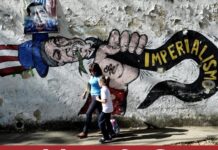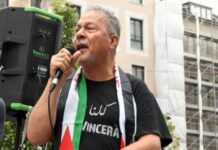
The European Parliament has delivered a blow to Israeli efforts to censor political discussion of Palestine within its parliamentary chambers. Palestinian writer Khaled Barakat has been fighting back extensively against a political ban imposed by the German state and the denial of his residence permit because of his speeches and activities for Palestine. As part of the campaign to protect Palestinian rights and freedom of expression in Europe as well as in occupied Palestine, Barakat spoke at the European Parliament on 10 July 2019 along with Charlotte Kates, Samidoun’s international coordinator, and Mohammed Khatib, Samidoun’s European coordinator.
They spoke at the invitation of MEP Manu Pineda, an elected representative from the Izquierda Unida (United Left) in the Spanish state. Since their talks, Barakat and Pineda have been attacked repeatedly by Israeli Minister of Strategic Affairs Gilad Erdan as well as an array of Zionist groups, who not only demanded that Barakat be barred from speaking at the European Parliament but that Pineda be removed from his positions on parliamentary commissions. Zionist organizations have bombarded staff members and spokespeople at the parliament with these demands, echoing those issued officially by Erdan in a letter to parliamentary president David Sassoli.
In a response to these attempts to silence speech on Palestine within the parliament, a press officer for the parliament’s Directorate-General for Communication issued a clear response to the smears and incitement:
“All MEPs and political groups can invite individuals and organisations for meetings in the European Parliament. Access to Parliament is provided in this context in accordance with the relevant rules, which are based on Parliament’s Bureau decision of 2 October 2017 to systematically deny access to all persons, groups, or entities involved in terrorist acts, as covered by Articles 2, 3, and 4 of Common Position 2001/931/CFSP.
“In view of that decision, and in the context of combatting terrorism, MEPs and political groups are requested not to invite persons listed in the Council Decision or individuals representing entities or groups on that list, nor to facilitate their access to Parliament.
“In addition, these persons, entities, and groups may not be promoted through audio-visual presentations or other events on Parliament’s premises.
“Accordingly,” he continued, “Mr Barakat and Samidoun, the Palestinian Prisoner Solidarity Network, are not amongst the persons or groups and entities covered by these provisions. Further, Mr Barakat did not enter Parliament’s premises as a representative of the Popular Front For the Liberation of Palestine (PFLP), nor did he speak on behalf of this group. The PFLP was not mentioned nor promoted during the event.
“The primary purpose of the visit was to offer Mr Barakat the opportunity to address a meeting in Parliament on Palestine-related matters, and oppose the speaking ban imposed upon Mr Barakat by German authorities in June 2019,” he concluded.
This response presents a clear rebuff to attempts to silence Khaled Barakat and others from speaking out on Palestine, particularly critical in a moment when European states such as Germany are imposing repressive political bans and residency orders on the basis of political advocacy for Palestine. German officials are even citing the May 2019 Bundestag resolution opposing the boycott, divestment and sanctions (BDS) campaign as justification for denying Barakat’s residency renewal, highlighting the very real dangers posed by these types of legal attacks on Palestinian rights.
International solidarity is continuing to mount in support of Barakat, whose political and legal fight – he is challenging these orders in German courts – has received solidarity from activists, parliamentarians and lawyers around the world. Jews for Palestinian Right of Return issued a statement in support, as follows:
Jews for Palestine Right of Return stands in solidarity with Khaled Barakat, a Palestinian writer and political activist who has been barred by the German state from participating in political activity. This is a racist form of repression and political targeting that aims to silence the Palestinian community in Germany, based on a false conflation of anti-Zionism with anti-Semitism.
Some claim that these attacks on Palestinian rights are a manifestation of German guilt over the Nazi holocaust against Jewish people. In reality, however, these repressive actions are encouraged, supported, and pushed forward by the far right in Germany, which embraces an alliance with Israel at the same time that it pushes anti-Arab, anti-Palestinian, and anti-Muslim propaganda. These far-right parties, such as the Alternative for Germany Political (AfD), are infamous for their own legacies of genuine anti-Semitism and racism.
Germany’s anti-Palestinian campaign is being promoted by Gilad Erdan’s Israeli “anti-BDS ministry,” funded with millions of dollars from the Netanyahu government to silence advocacy of Palestinian human rights, particularly in the U.S., Germany, UK, and other Western imperialist countries which arm apartheid Israel, just as they once armed apartheid South Africa.
In Germany, this repression includes the Bundestag’s recent anti-BDS resolution, the disinvitation of Talib Kweli and other performers who support justice in Palestine, the deportation of Rasmea Odeh, the closure of the bank account of Jewish Voices for a Just Peace, and the forced resignation of the director of the Jewish Museum. While Palestinians have been the primary target, the German state and right-wing similarly smear dissenting Jewish speech as anti-Semitic. Everyone who cares about justice and liberation suffers as a result.
All people, including those in Germany, have the right — and need — to hear directly from Palestinians. We call on Germany to immediately drop the political ban on Khaled Barakat, and end its policy of repression against those working for Palestinian freedom and human rights.
This struggle is, of course, not simply about an individual – it represents a threat to all advocates of Palestinian rights, and especially Palestinians themselves living in exile and diaspora. This is especially true at a time when Palestinians are facing attempts to liquidate their cause as manifested in escalating Israeli ethnic cleansing with the full support of the U.S. and the complicity of Arab reactionary regimes under the slogan of the “deal of the century.” In fact, Barakat was slapped with a political ban when he went to deliver a talk addressing how Palestinians and Arabs can confront U.S. president Donald Trump’s agenda for the region.
Internationally, your statements and voices of solidarity are critical in helping to fight back against this intensified repression. International solidarity can also help to make sure that more Israeli bids for censorship, suppression and silencing are defeated.
Send your statements, protests, photos and actions in solidarity with Khaled Barakat and Palestine to samidoun@samidoun.net or contact us on Facebook.
List of organizations and statements in support of Khaled Barakat (under construction)
Here are some of the solidarity statements we have received, as well as articles covering the situation:
- Members of European Parliament Manu Pineda and Pernando Barrena
- Member of Bundestag Diether Dehm (DIE LINKE)
- International Association of Democratic Lawyers
- Portuguese Communist Party
- European Association of Lawyers for Democracy and Human Rights (ELDH)
- Internationale League for Human Rights
- Association of Democratic Lawyers in Germany (VDJ)
- Unauthorized Disclosure Podcast
- Scottish Palestine Solidarity Campaign
- Marxist-Leninist Party of Germany (MLPD)
- Jews for Palestinian Right of Return
- Gruppe ArbeiterInnenMacht and REVOLUTION – International Communist Youth Organization
- Candidatura d’Unitat Popular (CUP) of Catalonia
- No One Is Illegal Vancouver
- Junge Welt
- Sindicato General di Base (Italian trade union)
- Lebanese parliamentarian Osama Saad
- Campaign to Free Georges Abdallah in Lebanon
- Revolutionary Communist Group
- Freedom Road Socialist Organization
- Struggle/La Lucha
- Red Flag in London
- Konfront.dk
- La Verite pour Adama campaign
- US Campaign for the Academic and Cultural Boycott of Israel
- Internationalt Forum – Denmark
- Philippines-Palestine Friendship Committee
- Secours Rouge of Belgium
- Youth Platform Zurich
- Collectif Palestine Vaincra
- ATIK (Confederation of Turkish Workers in Europe)
- Unified Campaign for the Release of Georges Ibrahim Abdallah
- ILPS (International League of People’s Struggles)
- Revolutionaire Eenheid
- UDAP (Unione Democratica Arabo Palestinese) – Italy
- Associazione Amicizia Sardegna Palestine and BDS Sardegna
- Anti Imperialist Action Ireland
- Skyline for Human Rights
- Palästina Solidarität
- BDS Türkiye
- Plate-Forme Charleroi-Palestine
- TeleSur English
- CAPJPO-EuroPalestine
- Secours Rouge Canada
- Proletari torinesi per il Soccorso Rosso Internazionale
- Electronic Intifada
- Palestine Matters
- Palestine Chronicle
- Indus News
- Middle East Monitor
- Redspark
- Fight Back News
- Al Hadaf News
- Quds News Network
- ISM France
- Group 194
- Palestina Libre
- International Middle East Media Center
Discover more from Samidoun: Palestinian Prisoner Solidarity Network
Subscribe to get the latest posts sent to your email.




